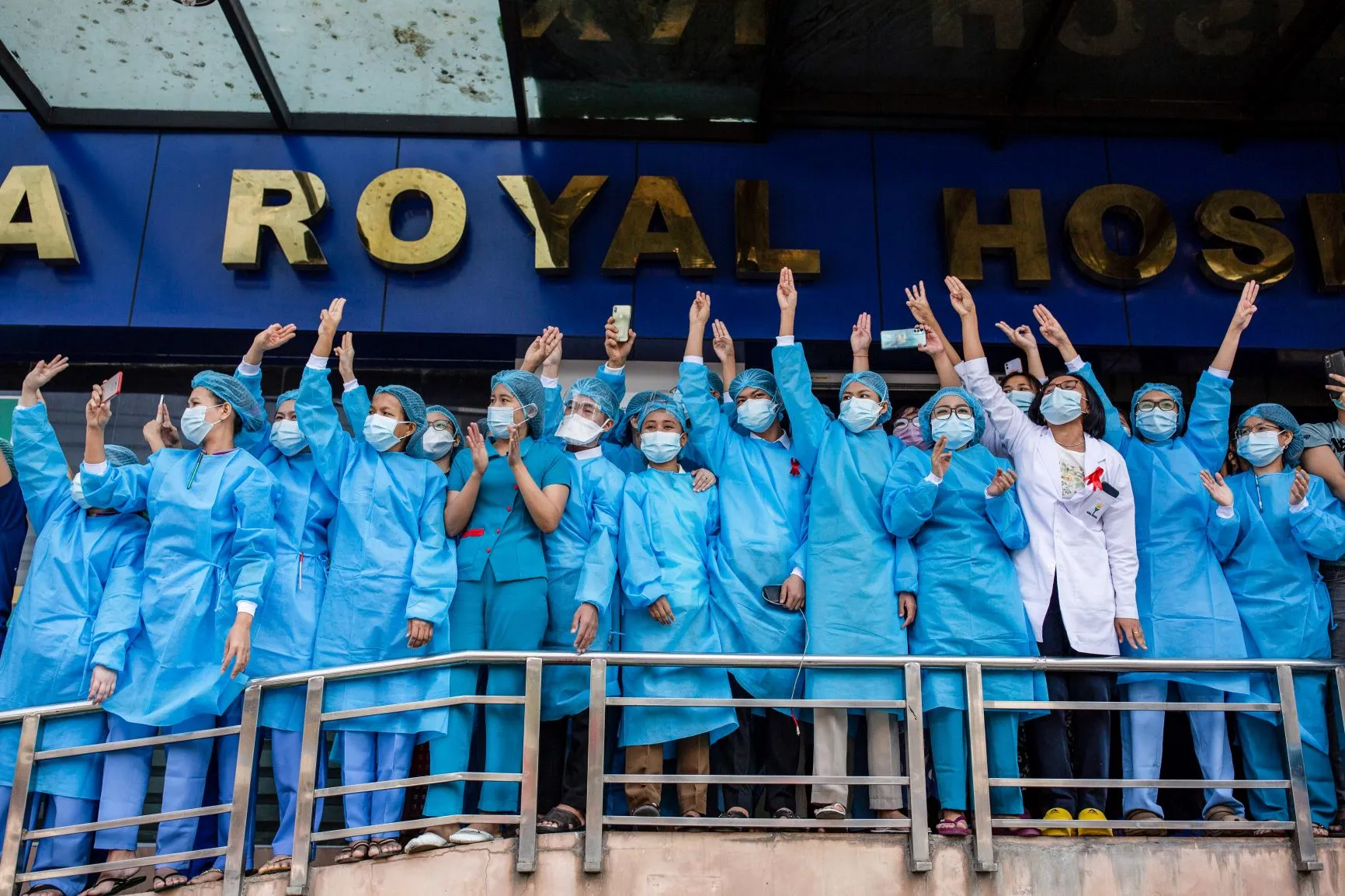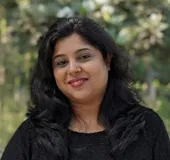
As Myanmar is reeling under the turmoil generated post-coup, the third wave of COVID-19 strikes. As of 19 July, the country clocked in
229,521 cases and 5,000 deaths; nearly
90 percent of the country is said to be affected. As of the first week of July, 296 of 330 townships across the nation have reported a spike in COVID-19 cases. The sudden surge in cases is directly attributed to a number of factors, namely, flawed coronavirus preventive measures, neglected healthcare and screening systems, mass protest movements, and sloppy vaccination campaigns. The sway of the military government over public services including health, edges the country closer to the brink of a health emergency.
The health indicators of the nation since 2010 have been improving in terms of child healthcare and women and child mortality rate. Life expectancy increased by
more than 12 years between 1990 and 2017. However, successful programmes aimed at stopping the spread of HIV, tuberculosis, and malaria, which was run by the toppled civilian government, has been held up. Low expenditure on health infrastructure and capacity remains a stark reality. More urgently, campaigns to vaccinate nearly a million children
against measles and other diseases have suffered. UNICEF, which provides vaccines for the programme, fears that it could mean deadly outbreaks in the coming months, after the monsoon season ends.
Low expenditure on health infrastructure and capacity remains a stark reality.
Myanmar’s healthcare system and coronavirus prevention measures have collapsed post 1 February. Myanmar, being strategically significant for India as a bridge to Southeast Asia and as a gateway to India’s Northeastern region, received its first COVID vaccine consignment consisting of
1.7 million doses on 22 January 2021. Consequently, it signed a Memorandum of Understanding with the Serum Institute of India for Covishield and ordered
30 million vaccines, some of which were dispatched on 11 February. The nation had begun its nationwide COVID-19 vaccination programme on 27 January under the NLD government, with healthcare staff and volunteer medical workers being the first to receive shots of vaccines donated by India.
The coup muddled much of the comprehensive plans to limit the spread of the virus. Two days after the military takeover, on 3 February,
healthcare workers, doctors, and civil servants across the country launched a national Civil Disobedience Movement (CDM) in opposition to the coup, refusing to work under the military regime.
Though the junta has urged people to get vaccinated, the arrests and attacks on the health professionals have restricted the number of professionals who can administer the vaccine dose.
In retaliation, the junta has launched various violent attacks on the healthcare workers. From February till May, there have been more than
170 instances of assaults on the lives of the health professionals, ambulances have been destroyed, and hospitals have been raided, bombed, or occupied by military troops. There has been
restrictions on treatments received by the wounded anti-coup protestors, obstruction of medics from reaching protest areas and raids of medical equipments from organisations offering emergency care. From April till May, arrest warrants were issued for around
400 doctors for their alleged participation in the CDM.
Such horrific incidences have affected the testing capacity and vaccination drive. According to the ruling junta, the number of people being tested for the virus has dropped to about 2,000 a day compared to nearly
25,000 daily tests before the coup. Though the junta has urged people to get vaccinated, the arrests and attacks on the health professionals have restricted the number of professionals who can administer the vaccine dose. As of 23 April, the military-controlled media reported that more than
1.5 million people had received the first dose, but only 300,000 people had received the second one. Many people, including healthcare workers, are in hiding for fear of being arrested, have boycotted the second dose, leaving 1.6 million unused doses of the vaccine from India.
Health experts fear many more cases are going undetected.
In recent days, the testing has gradually increased from 2,000 a day to
around 8,000-9,400 a day. But the positivity rate has also been rising. In mid-June, the ministry confirmed the presence of the Delta, Alpha, and Kappa variants of the virus. Health experts fear many more cases are going undetected.
The hospitals that remain operational are facing shortages in terms of staff, beds, and oxygen. Family members of most patients in need for oxygen are queuing outside oxygen factories. At such a time, there have been instances where the
military junta has raided those shops and restricted oxygen refills to the citizens.
The neglect of plans to prioritise vaccinations remains a concern. Such initiatives need to be premeditated and regularised in a systematic manner. Securing or locally producing an adequate amount of vaccines remains a key imperative. The military’s unwillingness to provide details about its vaccination programme prompted COVAX, the global vaccine-sharing programme, to
delay a shipment of 5.5 million doses in March. India had been the first to respond to the need of the nation by providing a total of 3.7 million vaccines; however, as India itself was hit by the second wave, China has come to the rescue by providing 500,000 vaccines in May. The military regime has recently entered into an agreement with China through which it is buying 5 million doses of vaccines. Russia, on the other hand, will transport the
first batch of 2 million doses purchased from the country. Additionally, the regime shall arrange for the Myanmar Pharmaceutical Industry to manufacture the vaccines with support from Russia, which has promised to provide technical help on vaccine production.
India had been the first to respond to the need of the nation by providing a total of 3.7 million vaccines; however, as India itself was hit by the second wave, China has come to the rescue by providing 500,000 vaccines in May.
Nevertheless, there is a strong public resentment against China, as it has been key towards shielding Myanmar against any reprimand before the United Nations Security Council (UNSC); anti-coup sections of the Myanmar population are sceptical of the China-made vaccines. Whether they will have more choice towards accepting vaccines is quite improbable, especially due to the current rise in the number of cases and deaths.
As India is recovering from its second wave, it may slowly restart its Vaccine Maitri initiative. New Delhi maintains that
COVID-19 support will be provided despite the coup for the well-being of the citizens of Myanmar. According to several analysts, the vaccine diplomacy is also intended to push back against China's clout within the region and win goodwill. Contrasting China, India has not faced any serious backlash from the public as its involvement in the region is not viewed as coercive as China’s.
Nonetheless, what the country currently requires is prioritisation to secure lives of citizens. The doctors rather than being arrested, wounded, or killed should be brought back to work with respect. The military government needs to recalibrate its strategy and lift its restrictions on healthcare professionals participating in the CDM. Universal health coverage was a key aspiration in Myanmar's national health plan till 2030. Now those health gains and aspirations seem very much under threat if the people within the nation continue to fight against each other rather than fighting to end the pandemic in unison. Though such a scenario seems improbable in the near future, however, the current government needs to take measured and peaceful steps to bring stability.
The views expressed above belong to the author(s). ORF research and analyses now available on Telegram! Click here to access our curated content — blogs, longforms and interviews.
 As Myanmar is reeling under the turmoil generated post-coup, the third wave of COVID-19 strikes. As of 19 July, the country clocked in 229,521 cases and 5,000 deaths; nearly 90 percent of the country is said to be affected. As of the first week of July, 296 of 330 townships across the nation have reported a spike in COVID-19 cases. The sudden surge in cases is directly attributed to a number of factors, namely, flawed coronavirus preventive measures, neglected healthcare and screening systems, mass protest movements, and sloppy vaccination campaigns. The sway of the military government over public services including health, edges the country closer to the brink of a health emergency.
The health indicators of the nation since 2010 have been improving in terms of child healthcare and women and child mortality rate. Life expectancy increased by more than 12 years between 1990 and 2017. However, successful programmes aimed at stopping the spread of HIV, tuberculosis, and malaria, which was run by the toppled civilian government, has been held up. Low expenditure on health infrastructure and capacity remains a stark reality. More urgently, campaigns to vaccinate nearly a million children against measles and other diseases have suffered. UNICEF, which provides vaccines for the programme, fears that it could mean deadly outbreaks in the coming months, after the monsoon season ends.
As Myanmar is reeling under the turmoil generated post-coup, the third wave of COVID-19 strikes. As of 19 July, the country clocked in 229,521 cases and 5,000 deaths; nearly 90 percent of the country is said to be affected. As of the first week of July, 296 of 330 townships across the nation have reported a spike in COVID-19 cases. The sudden surge in cases is directly attributed to a number of factors, namely, flawed coronavirus preventive measures, neglected healthcare and screening systems, mass protest movements, and sloppy vaccination campaigns. The sway of the military government over public services including health, edges the country closer to the brink of a health emergency.
The health indicators of the nation since 2010 have been improving in terms of child healthcare and women and child mortality rate. Life expectancy increased by more than 12 years between 1990 and 2017. However, successful programmes aimed at stopping the spread of HIV, tuberculosis, and malaria, which was run by the toppled civilian government, has been held up. Low expenditure on health infrastructure and capacity remains a stark reality. More urgently, campaigns to vaccinate nearly a million children against measles and other diseases have suffered. UNICEF, which provides vaccines for the programme, fears that it could mean deadly outbreaks in the coming months, after the monsoon season ends.
